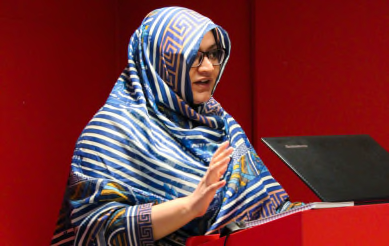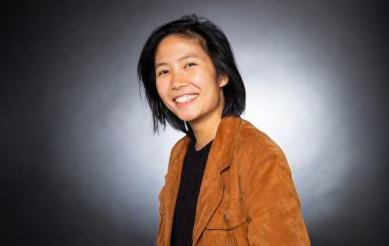The Power of Self-Advocacy and Peer Support: Nadia Zhuk’s Self-Taught Programming Journey

Nadia Zhuk is a self-taught full stack software engineer whose mission is to help people without technical backgrounds learn to code and build successful careers in tech. As a child, she was intimidated by technology but in her mid-twenties, a career change led her to embrace software engineering. In the latest #WomenWhoMaster series Nadia shares how she learned to believe in herself, the importance of having a circle of support, and what she hopes for the future of the tech industry.
Q: Can you tell us about your job and what a typical day at work looks like?
I am a full stack product engineer at Intercom. I focus primarily on building and improving chatbots and other kinds of automation. I spend my days building new features, refactoring existing code, or working on product health.
Q: Can you tell us about your childhood and how you got into the tech industry?
My story is pretty different from many people working in STEM. I grew up in the 1990s in post-Soviet Belarus. It was a difficult time, for my country and my family as well. We could only afford our first computer when I was 15 – that was in 2006. When I was growing up, I had zero connection to tech and didn’t really have any interest in it. I was always more drawn towards humanities: reading, writing, and foreign languages. Those interests led me to be an editor and journalist at an independent news magazine.
When I was 25, we closed down the magazine, and I had to figure out what to do next. I knew I wanted to move from Belarus to Poland, and I also knew that I was lacking the skills I needed to make this move successful. After some research, it became clear to me that I needed technical skills to be employable in a new country. However, I was still intimidated by technology. I felt like there were the kind of people who could code and then there were people in the other camp, people who were better with humanities. I felt I was in the second camp.
Q: Is that when you started teaching yourself technical skills?
Yes. I started learning in bits and pieces. First I learned Excel, then Photoshop, and then other technical programs. Then I made the jump to coding. I didn't go to university or a boot camp to learn. It was just me and my computer.
It was quite a challenge. I had to find books and resources online and then see what worked and what didn’t.
"In nine months I went from having zero technical skills to being employed as a programmer in Poland. Learning those skills helped me move countries, opened up new opportunities, and improved my quality of life."
Q: What’s a piece of advice you would give to other women in STEM careers?
Some of my favorite pieces of career advice come from the book, “Nice Girls Don't Get The Corner Office.” It’s a book about the unconscious mistakes women make that sabotage their careers. One of these mistakes is not standing up for yourself during salary negotiations or when asking for a promotion. This might be challenging for women who have been socialized to please everyone around them and who are afraid of being perceived as “difficult.” But it’s so important to learn how to stand up for yourself and fight for what’s yours!

"Women have to build a personal brand and self-advocate because nobody else will do it for them."
Q: Did you have a mentor, a specific person, that you met during this career change process that really helped and guided you?
When I first started out in tech, I didn’t have an industry mentor, and it’s one of my regrets. Luckily I was introduced to a very experienced mentor midway through my career. Even though I only had one mentoring session with her, she provided me with so much guidance and helped me find my way in the world of tech. Mentorship can be incredibly powerful, and sometimes one session is all you need to find answers to your questions.
Nowadays I mentor other people who are learning to code, and I can’t overestimate the importance of mentorship and external support. The first thing I recommend to codenewbies is to build a circle of support. It can be in real life, like a study group, or online, like #100DaysofCode. Having a circle of support will help you stay motivated when learning becomes difficult and later it will help you navigate complex career situations, like leaving a toxic workplace or asking for a promotion.
Q: One of the ways you help people who are learning to code is by sharing your experiences, like in your book Crossing the Rubycon. What can women learn in the book?
The book is both my personal story and a step-by-step guide on how to learn to code if you have no technical skills. I first thought of writing it when I was looking at what resources already existed for people learning to program. I realized there wasn’t much content created by truly non-technical people. It seemed that most content creators had a technical background of some kind prior to becoming programmers, and I never saw myself in those stories.
The book is meant for people like me – people without any technical backgrounds who want to learn to code and build a career in tech. It’s meant to be their personal career coach. A resource to refer to whenever they lose confidence in themselves or feel they cannot move on. The book includes a step-by-step guide on how to gain technical skills, how to land your first coding job, and then how to build a successful career as a programmer.
Q: Imagine for a moment that your great-granddaughter chose the same career as you. She's graduating college in the year 2100. What do you want her future to look like?
I would like her, just like everybody else, to feel empowered and remember that she can do anything she wants. I hope that there are fewer limitations and less gatekeeping, both internal and external. Most importantly though, by then I hope we don’t have to talk about women in tech or men in tech because the kind of problems we’re discussing right now no longer exist.
Check out Nadia’s blog and YouTube Channel for resources on teaching yourself to code. Check out Nadia’s book if you want to break into tech. Connect with her on Twitter, LinkedIn or Instagram.
Women Who Master puts a spotlight on women who have made outstanding contributions to STEM fields. The goal of the series is to celebrate those contributions, inspire future leaders, and help close the gender gap in technology.
Photo credit: Nadia Zhuk
#WOMENWHOMASTER
MEET THE MASTERS AT THE FOREFRONT OF STEM

Faiza Yousuf

Gabby Llanillo

Sara Inés Calderón

CODECADEMY AND LOGITECH
Partnering to inspire the builders of tomorrow, MX Series and Codecademy give you the tools needed to build, scale, and code to your fullest potential. Learn essential coding, programming, and AI skills to reimagine the future of tech with one free month of Codecademy Pro.

Women Who Master
Logitech MX is committed to spotlighting and supporting impactful initiatives and individuals that are disrupting the industry worldwide, to inspire girls and women to pursue a career or continue thriving in STEM.
With #WomenWhoMaster, our mission is to ignite an industry-wide movement that addresses the gender gap and unequal access to opportunities in tech and IT, once and for all.
